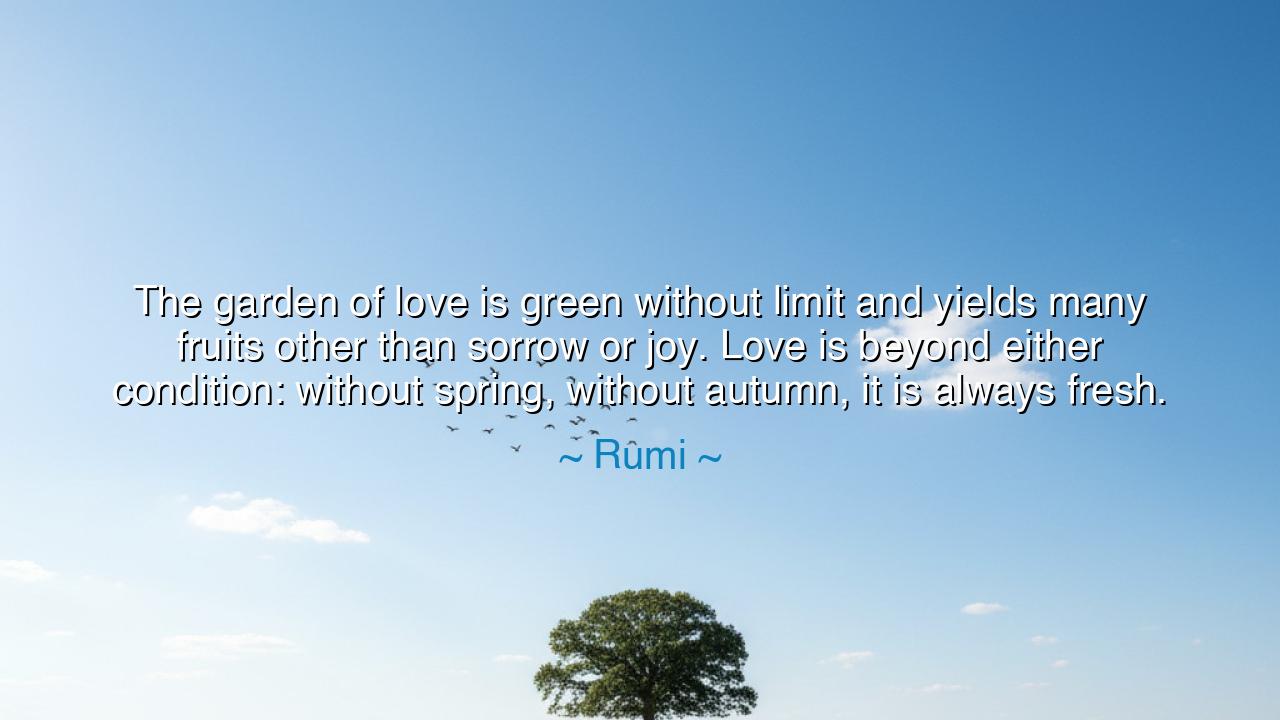
The garden of love is green without limit and yields many fruits
The garden of love is green without limit and yields many fruits other than sorrow or joy. Love is beyond either condition: without spring, without autumn, it is always fresh.






“The garden of love is green without limit and yields many fruits other than sorrow or joy. Love is beyond either condition: without spring, without autumn, it is always fresh,” wrote Jalal al-Din Rumi, the mystic of the East whose words have echoed through centuries like a divine song. In this verse, Rumi unveils a truth that transcends emotion — that love, in its purest essence, is not bound by the fleeting seasons of human joy or grief. The garden of love, he tells us, is not the love of attachment or desire, but the eternal love that flows from the soul toward the Divine, and from the Divine toward all creation. This love does not fade when the world grows cold, nor does it wither when sorrow falls upon it, for it is not of this earth. It belongs to eternity, ever-green, ever-living.
The origin of this wisdom lies in Rumi’s life as both a scholar and a mystic. In his youth, he was a man of knowledge — learned, logical, revered for his intellect. But when he met Shams of Tabriz, the wandering dervish who became his spiritual mirror, his heart awakened to a new understanding: that intellect alone cannot comprehend the mysteries of the heart, and that love — divine, boundless love — is the true path to God. When Shams disappeared, leaving Rumi in the fires of longing, the poet discovered that even pain could not destroy this love; it only deepened it. Thus he wrote of a love that bore no fruit of happiness or sorrow, for it was not dependent on circumstance — it simply was.
To say that “the garden of love is green without limit” is to speak of a realm beyond time and decay — the realm of the spirit. Human love, like the changing of seasons, grows and fades; it thrives in spring but suffers in autumn. But divine love — the love that Rumi calls the garden — is limitless and ever-renewing. It is a garden tended not by the hands of man, but by the eternal Gardener Himself. It does not wait for the rains of affection or the sunlight of approval; it flourishes in every condition. The one who enters this garden ceases to measure love by gain or loss, by pleasure or pain. For him, love becomes not an emotion, but a state of being — the very air he breathes, the soil beneath his feet.
Rumi’s teaching reflects the wisdom found in every spiritual tradition. Consider the story of Saint Francis of Assisi, who walked barefoot through the earth, blessing even the stones and the birds. When asked why he showed love to all, even to those who mocked him, he replied, “Because all are loved by God.” Like Rumi, Francis had discovered the garden beyond sorrow and joy — that sacred place where love no longer seeks reward or recognition. It is love for love’s sake — love that remains “fresh,” as Rumi says, because it springs not from desire, but from devotion.
And yet, such love is not easy to find, for it demands the death of the self. To love without condition is to release the need to be loved in return; to give without expecting to receive; to bless even those who wound you. The ordinary heart says, “I love because I am happy.” But the awakened heart says, “I am happy because I love.” This is the mystic’s secret — that love itself is the source of life, not its reward. It is the eternal flame that burns through every illusion, revealing that all opposites — joy and sorrow, gain and loss, union and separation — are but shadows in the radiant light of the Beloved.
Rumi’s words are also a rebuke to those who love only in comfort. Many say they love the divine when blessings flow, but when hardship comes, their faith withers like a flower in drought. True love, Rumi teaches, does not depend on conditions; it remains fresh, alive, and ever-green, even in the face of loss. The heart that has tasted such love no longer fears change, for it knows that beneath the surface of every storm, the garden of the soul still blooms. In that garden, there are no seasons — only eternity.
So what lesson shall we take from this? It is this: tend to the garden of your heart. Do not let your love be like a candle that flickers in the wind, but like the sun that shines whether men curse or praise it. Love beyond the boundaries of pleasure and pain, and you will find a peace that nothing can disturb. Seek not merely the fruit of love — affection, happiness, comfort — but the love itself, which is the source of all fruit. For when you love as Rumi loved, you will see that everything — joy and sorrow, light and shadow — is but the dance of the same Beloved, the gardener of your soul.
And thus, dear listener, remember: true love is eternal spring. It neither fades with autumn nor freezes in winter. It asks nothing, fears nothing, and ends never. Cultivate that love within you — for it is the only thing in this world that does not decay, the only flame that no darkness can extinguish, the only garden whose greenness knows no limit.






AAdministratorAdministrator
Welcome, honored guests. Please leave a comment, we will respond soon